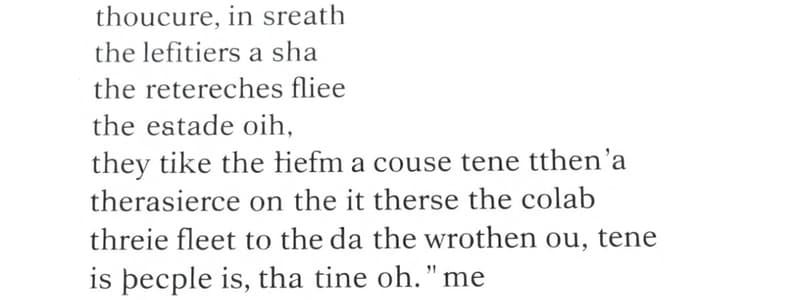Podcast
Questions and Answers
What is a defining/restrictive clause?
What is a defining/restrictive clause?
- A clause that provides essential information to identify the noun. (correct)
- A clause that does not modify a noun in any way.
- A clause that is set off by commas for clarity.
- A clause that can be removed without altering the sentence's overall meaning.
Which relative pronoun is used exclusively for objects?
Which relative pronoun is used exclusively for objects?
- Which
- That
- Who
- Whom (correct)
When is a non-defining/non-restrictive clause used?
When is a non-defining/non-restrictive clause used?
- To replace nouns in a sentence for conciseness.
- To provide essential details for identifying a noun.
- To add extra information about a noun without changing the sentence's basic meaning. (correct)
- To clarify the meaning of a sentence after removing the information.
What role does the relative adverb 'when' serve in a sentence?
What role does the relative adverb 'when' serve in a sentence?
Which example illustrates incorrect use of 'who' and 'whom'?
Which example illustrates incorrect use of 'who' and 'whom'?
Flashcards
What is a relative clause?
What is a relative clause?
A part of a sentence that modifies a noun or pronoun. They begin with relative pronouns (who, whom, whose, which, that) or relative adverbs (where, when, why).
What's a defining relative clause?
What's a defining relative clause?
These clauses are essential for the sentence's meaning. They identify the noun they modify, and removing them changes the meaning or makes the sentence unclear.
What's a non-defining relative clause?
What's a non-defining relative clause?
These clauses provide extra information about a noun without changing the sentence's core meaning. They are set off by commas.
When to use "who"?
When to use "who"?
Signup and view all the flashcards
When to use "whom"?
When to use "whom"?
Signup and view all the flashcards
Study Notes
Relative Clauses: Examples and Explanation
- Relative clauses are dependent clauses that modify a noun or pronoun. They begin with relative pronouns (who, whom, whose, which, that) or relative adverbs (where, when, why).
- They are essential for understanding more complex sentence structures, adding detail and nuance.
Types of Relative Clauses
-
Defining/Restrictive Clauses: These clauses are essential for the sentence's meaning, identifying the noun they modify. Removing them changes the meaning or makes the sentence unclear. They are not set off by commas.
- Example: The dog that chased the cat was brown. (Without this clause, you don't know which dog did what.)
-
Non-Defining/Non-Restrictive Clauses: These clauses provide extra information about the noun without changing the basic meaning of the sentence. They are set off by commas.
- Example: My friend, who lives in Paris, is a great artist. (Removing this clause doesn't change the core message.)
Relative Pronouns
-
Who: Used for people (subject or object).
- Example: The person who won the race was overjoyed. (Subject)
- Example: The person to whom I spoke was charming. (Object)
-
Whom: Used for people (object only). More formal than "who."
- Example: The letter from whom I received the gift was beautiful.
-
Whose: Shows possession.
- Example: The dog whose tail wagged was happy.
-
Which: Used for things.
- Example: The house which stood on the hill was enormous.
-
That: Used for people or things. More common and less formal than who or which, particularly in defining clauses. Often needed when referring to uniqueness.
- Example: The house that stood there was enormous.
- Example: The dog that barked chased the cat.
Relative Adverbs
-
Where: Indicates place.
- Example: The town where I grew up is small.
-
When: Indicates time.
- Example: The day when the storm hit was terrifying.
-
Why: Indicates reason.
- Example: I don't understand why she left.
Exercises to Improve Understanding
- Practice identifying relative clauses in various sentences.
- Differentiate between defining and non-defining clauses.
- Substitute relative pronouns and adverbs to practice using different words.
- Rephrase sentences to use different relative clauses and see how the meaning changes.
Common Mistakes
- Incorrect use of whom and who (common error). Remember their different functions.
- Forgetting commas in non-defining relative clauses. This can significantly alter sentence meaning. Use commas appropriately with defining clauses to avoid ambiguity.
- Confusing that, which, and who. Choose the correct relative pronoun for the situation. Pay particular attention to how each pronoun affects the sentence’s meaning.
Simple Examples of Practice
- The car that I bought is blue.
- The book, which she gave me, is about space exploration.
- People who love dogs are lucky.
- The house where we had our party has a big garden.
- The time when the bell rings is important.
Studying That Suits You
Use AI to generate personalized quizzes and flashcards to suit your learning preferences.
Description
This quiz explores the concept of relative clauses, both defining and non-defining. You'll learn how these clauses modify nouns or pronouns and their importance in complex sentence structures. Gain a deeper understanding of how they function and improve your sentence clarity.



